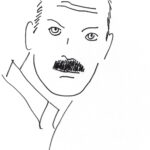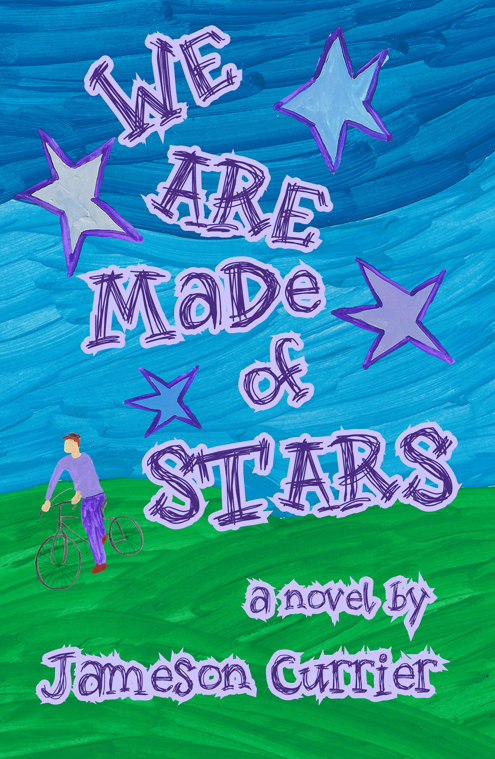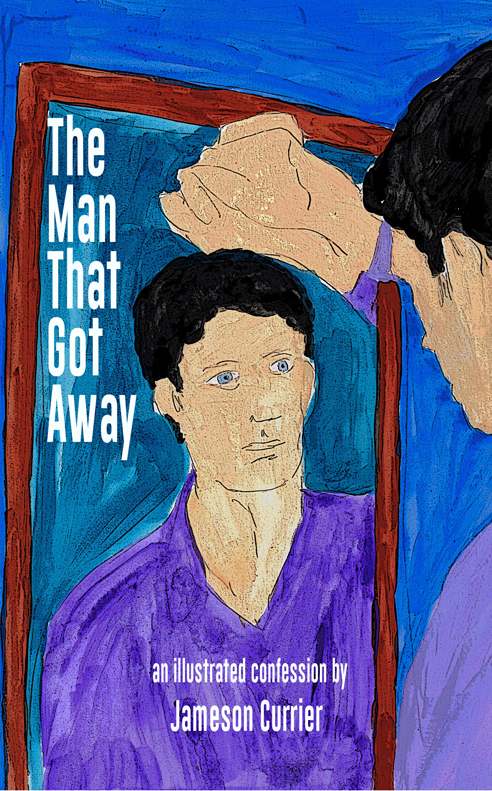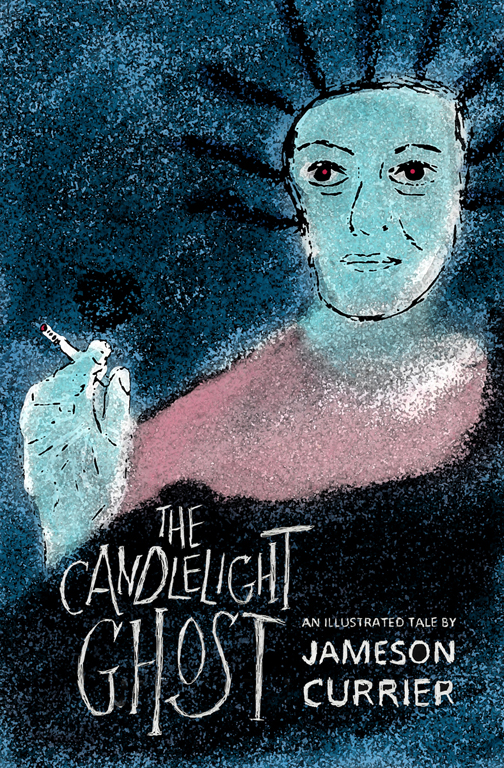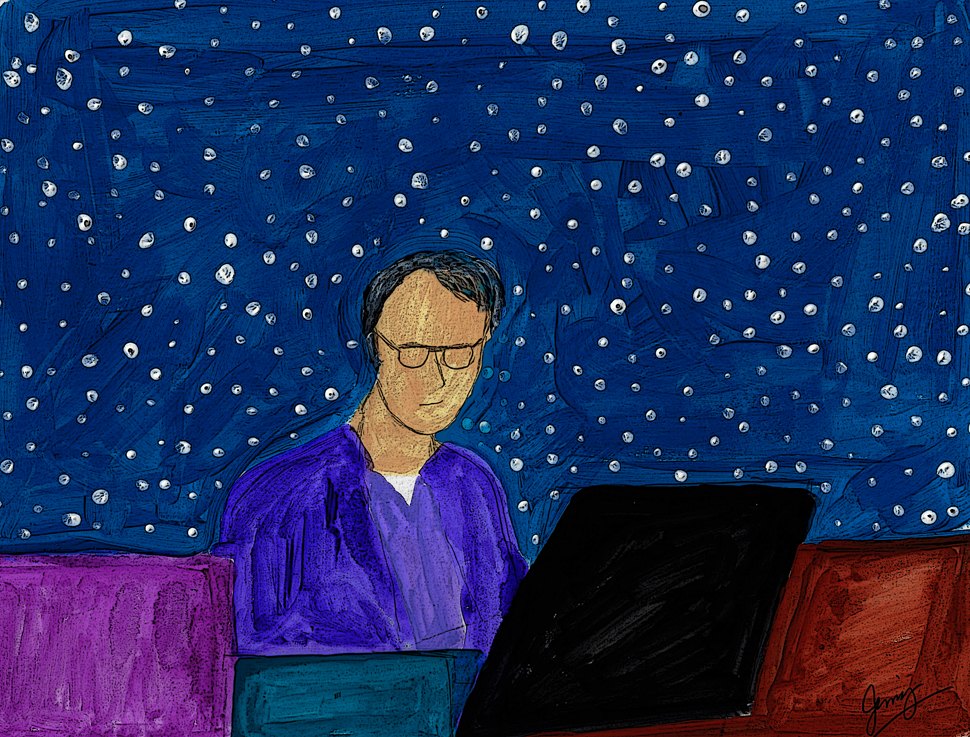
illustration by Jameson Currier
What Would Q Do?
by Jameson Currier
At noon, you are still working at your desk eighteen floors above the southern edge of Times Square. It is warmer in your glass office than it is in your icy apartment six blocks away. Outside your office window, “Snowpocalypse” has begun. Your view of New Jersey across the Hudson River has disappeared, something you are not entirely upset about. Forecasters have predicted thirty-six inches of snow. Your colleagues are abandoning their posts, scurrying out of the building to trains, taxis, and buses before they stop running. You are grateful for their panic. You are fifty-nine years old. Your desk is a pile of problems. Your job is to put out fires. Solve corporate mishaps. Repair international mistakes. All by remote, from the keyboard, mouse, and computer screen on top of your desk. No travelling allowed. No expenses incurred. You are grateful your phone has stopped ringing. You are happy your email inbox is empty of new messages.
You remain in the warmth of your office. You use the quiet to catch up on the tasks you are unable to do when you are busy with visitors and meetings. You finish reading a financial report of an Italian subsidiary, update a document about the company’s internal business units, and research a labor issue in Brazil. You are writing an email about an employee issue in the Warsaw office when you hear your name echo down the hallway. It is Kristin, one of the attorneys on the floor, saying, “I’m sure he can help you.”
Seconds later she arrives at your office door. She is a slim, sharp-witted woman, mother of two children not yet out of day care. There is a wild, fearful look in her eyes that you gather is from her anxiety over lingering too long in the office to make it safely to her suburban home. She is escorting a gentleman that can only best be described as a live-action version of James Bond. He is introduced to you as Harold Somethingoranother. He is over six feet tall, impeccably dressed in a pale blue-gray suit, hand-tailored to reveal every inch of his toned but not overly muscled physique. His eyes match the color of his suit. His hair is wavy, the color of ocean sand, slicked back from his widow’s peak in deep rivulets.
You stand when he walks into your office, something you rarely do when visitors arrive. You shake his hand. It is a tight, professional, no-nonsense grip. His greeting and your name arrive with a British accent. Upper crust. Aristocratic. Over educated. And highly confidential.
Everything becomes a roar and a blur. As he explains his dilemma—he is in from Dubai for a sales conference and has a twelve-million-dollar contract that needs to be legalized—your eyes flicker between Kristin and Harold Somethingoranother. You are a fifty-nine-year-old gay man, smitten by a new client with spy-killing movie star looks. Your cheeks are flushed. Your ears are burning. Your breathing is shallow. When you ask to review the contract, your voice sounds prissy and weak.
Kristin’s worried expression manifests into hand-waving and gestures. She excuses herself, thinking you can handle everything ahead, sliding your office door closed as she leaves. You are now alone with James Bond in the warm, brightly-lit glass aquarium that is your office. He explains that he only has an electronic version of the contract, and it is on his laptop that he holds in his hands. He says he will email it to you, and he flips open the computer. He asks you for the password for the wireless network in the building, something you don’t use because you work too much already for your pay grade and refuse to be tethered non-stop to a mobile device. The person you know who could send you the password has already left the building. You are suddenly worried that you cannot easily solve this overly handsome man’s problem and get him on his way, when you think of a solution. You ask him to download the contract from his laptop onto a thumb drive that you quickly find in a desk drawer. He smiles and says, what a nifty idea, as if it is so low-tech and old-fashioned.
You examine his contract on your computer. It is a corporate application for a line of credit that has required him to include personal information. His home address, age, date of birth, marital status. The application is bordered by logos of international organizations and associations as color graphics. The printer at your desk only handles black and white ink cartridges. You advise James Bond that the application looks fine and you will send three copies to the mopier down the hallway, a multi-function machine that will print the document in color.
You excuse yourself and leave your office to retrieve the printed document. As you rush down the hall you are thinking:
1. That you are moving much too quickly to seem either professional or age-appropriate.
2. James Bond’s age on the application was indicated as thirty-three.
3. You are old enough to be his father.
4. His application said he was single.
5. You are not too old to imagine yourself as his lover.
6. You are smiling at the idea of James Bond waiting for you. How long has that been? A handsome man, waiting for your return?
Back in your office you present Secret Agent 007 with the documents for his signature. He signs and you add a variety of embossed seals and ink stamps to make it official. You tuck the final documents into an envelope and hand them over to him. His problem has been solved. He smiles, stands, shakes your hand, thanks you by name, says, “I’m incredibly grateful. You are a lifesaver.” And then he is gone.
You sit at your desk for a minute to gather your wits. You remember every moment of the meeting, as if it were a one-night stand that you did not want to end. You go to the door of your office and look down the hallway, hoping to see a parting image of him, but he is gone. You walk down to Kristin’s office, wanting to find a witness who could verify that the meeting took place, that it was a real occurrence, not a silly old queen’s mirage in a snow storm. Her office is dark, the glass door locked. She has fled the building. You walk back to your office smiling and shaking your head in disbelief. A few minutes later you are involved with solving a problem in the Istanbul office, where it is not snowing.
You work through the storm, occasionally checking news reports. The city is shutting down. Subway and bus service are being suspended. Driving is banned. Flights are being grounded and canceled. A travel ban is in effect. “Rapidly deepening winter storms are very challenging to predict,” a weather service reports. The mayor has even put a squash on food delivery. No Chinese takeout tonight. No Pad Thai, burritos, or pizza brought to your door, courtesy of a bike-riding fiend. Corporate emails arrive suggesting all employees consider safety when traveling and to use discretion if attempting to make it to the office the following day. It looks as if tomorrow will never happen. Snowpocalypse is here.
At the end of the day, you slide on your snow boots, a pair of cheap plastic shoes that bind your feet into more misery than a geisha could ever feel. You layer yourself in a black sweater, a black down vest, a black leather jacket, and a black scarf. So much for having a gay chromosome, you think. You have no fashion style. You have no shopping gene. You are the epitome of urban invisible: a fat black circle of differing fabrics. You find your gloves and knit cap and make your way to the elevator.
Outside the office windows it is dark. Evening arrives early. You cannot see the streets below. The snowing continues. On your floor everyone has left. Motion activated lights have powered down, leaving ominous black holes where there are offices and cubicles. The elevator arrives quickly, but you are startled when it stops on a floor, three stories below. The door opens, and a tall man enters. He is not wearing any winter outerwear. He is dressed in a pale blue-gray suit. He looks at you, leaning down to find your eyes. “What luck!” he says. “My lifesaver! My client has bailed on me. The show is canceled. You don’t have any plans, do you? Why not join me for a drink?”
You stand there frozen. It is not a cold frozen. It is a frightened frozen. A terrified frozen that is filled with astonishment, awe, disbelief, and glee. Did James Bond just ask you to have drinks with him? Is this a test? Some kind of a hidden camera scam? What would Q do if Bond asked him for a drink? Not the revamped-young-tech-queer geek version who also happens to be a cute actor, but the elder, cranky gadget-maker. The old man with clown-like graying hair who hasn’t shaved in days who fumbles and falters every time Bond shows up. Would Q shrug off an offer like this? Or would he be a good sport and socialize with an overly handsome, younger-than-himself, spy-killing movie star?
You don’t remember saying yes. You don’t remember shaking your head in agreement. You don’t remember smiling or giggling like a school girl. Instead, you remember the flush at your cheeks, your ears burning, your voice rising to an octave only canines can hear.
You follow James Bond through the lobby of your office building and outside into the snowstorm. The chill is a bitter ruler, the wind an evil dominating force. You must blink to keep the snow out of your eyes. But James Bond is unfazed. He doesn’t tense. He doesn’t alter his posture or his stride. He leads the way, suggesting a drink at his hotel, just across the block.
It is nineteen steps through the snow to the hotel. James Bond makes it in eleven. In the hotel lobby, you shake off the snow. There are wet splotches on the shoulders of your jacket and the knees of your pants. When you pull off your cap you are mortified you might have hat hair. You look around for reflective surfaces as you pat the top of your skull, but you find nothing to ease your horror. You look at James Bond. He is now the special, deluxe version in high definition. In the high-tech lighting of the lobby his hair glistens. His skin sparkles. His smile is even, perfect, pearly white.
A maître d’ escorts you to a table beside the expansive floor-to-ceiling windows looking down at a Manhattan panorama of dark, swirling evening snow. The hotel décor is urban modern. Sleek leather cushions, marble top tables. James Bond orders a martini, “shaken, not stirred.” You order a glass of wine, hoping it registers as a healthy choice and not a girly one.
He mentions that the hotel has been generous, upgrading his room by juggling cancellations and late minute bookings. He says he has a lovely suite, with all the amenities. You keep him talking, asking him questions about his travel: When did he arrive? How long does he plan to be in the city? Where will he travel next?
The drinks arrive, and you offer a toast to “Snowpocalypse.”
“Is that what they’re calling this?” he asks. “Isn’t that glorious. Truly memorable. I love being in New York. I love that office of yours. What a brilliant view!”
On the corporate scale, he is much higher on the ladder of success than you are. The company where you work has thousands of employees. He is a rock star who earns bonuses, options, and commissions. If he worked in New York, that office would be his. You are a corporate requirement who got an office by longevity and downsizing. But you are both necessary to the survival of the company. You are the gadget the spy-killing movie star needs to stay alive. You tell Harold Somethingoranother that on sunny days, sitting at your desk can be a true pain. Too much sunlight. Too much squinting for a view of New Jersey. You tell him you may need to invest in a pair of sunglasses soon.
You are horrified that you are complaining and try to turn it into a joke, worried he might report you to hundreds of higher ups above your pay grade, or worse, that he might have grown up in New Jersey and hold everything against you the way all people from New Jersey do against people who live in Manhattan. You decide to keep your mouth shut, to deflect any further questions away from yourself, asking him more questions about himself. Does he travel often for his job? What is his favorite place to travel? His favorite hotel?
He loves answering your questions, loves talking about himself. You like listening to his voice, looking at his expressions. It is like being on a yacht gliding along the Mediterranean.
When he is at the bottom of his martini, he smiles and asks you, “You’ll stay for bite, mate?” He doesn’t wait for your answer, knowing, of course, that no one ever turns down James Bond. He flags a waiter, asks for menus, orders another round of drinks.
He takes command when the waiter arrives with the menu, not letting him disappear to another table. He asks about specials, the house favorite, the chef’s best, and the waiter’s personal opinion. James Bond decides on a prime cut steak, cooked rare. He suggests the salmon for you because it sounds like a special treat. You don’t put up any protest. You wonder where he has been all your life. Why can’t James Bond order all your meals? Why can’t he make all of your decisions?
He talks about the office in Dubai, the high profile of the company in the region. You learn he grew up in London and Cairo, speaks Arabic and French, studied Middle Eastern politics in college, and graduated with honors. You avoid mentioning anything about yourself, fearful that he will lose interest in the tedious humdrum of your life at the center of the most important city of the world.The wine is making you sleepy, the snowing outside is making you dizzy, but the night flies by because you are giddy in love. He has not removed his jacket, not even unbuttoned it or loosened the collar of his shirt or moved his tie, but you have seen his chest expand, rise and fall as he breathes and speaks, his biceps curl and unfurl as he drinks and eats, his lips glide across his teeth as he smiles. His eyes brighten and widen when he describes his passion for surfing in Fiji, his Adam’s apple floats up and down his long neck as he sips his martini. You imagine him in a wet suit carrying a surfboard. This is better than TV. Better than a Broadway show. Much better than any Bond movie ever made.
As dinner progresses, you learn he has a younger brother who was married the year before in London to a girl James Bond had once dated. Now the super-secret agent has a current girlfriend in Dubai and another one in Qatar. He still keeps in touch with an ex-girlfriend he dated in Cairo and another in London, which you gather means he sleeps with each of them when he visits. He shows you photos of the brother with the wife on his cellphone, flips through a folder of photos and shows you the current girlfriend in Dubai (a thin, leggy blonde supermodel) and the ex in London (a thin, leggy blonde supermodel). You mention that they both look alike, and he laughs and agrees.
“I suppose I have a type,” he says, not bragging at all.
More photos are displayed, one of which was taken on the beach at Fiji. The image burns into your retinas. James Bond is standing next to one of the blonde supermodel girlfriends, wearing a swimsuit, low-cut below his hips. His chest is covered with ocean sand brown hair, a treasure trail of hair leads to his trunks. There is no body fat, only lean, defined muscle. You can see every detail of his fur-covered abs. You worry you are studying the image too hard, the way you look at porn. His cellphone is burning up in your grasp, so you hand it back to him. You ask how the surfing was in Fiji on his last visit. His answer washes over you because you wonder if he thinks that you are an elderly gay man seeking affection from a younger stranger. You wonder if you will be tomorrow’s joke with his brother, the wife, any of the girlfriends, current or ex.
He mentions he was hoping to take in the surf in California. He is supposed to be at a conference in San Francisco tomorrow, was planning on catching the waves at Big Sur later in the week. As he describes the differences between surfing in California and Australia, the challenges of each locale, you think about how unfair life is. Some men are born with natural, attractive gifts: handsomeness, athletic physiques, ocean sand brown hair that can be combed into rivulets. You have never felt attractively gifted. Your hair grows like cat whiskers, long, thin, invisible, and touchy. You have never been athletic. Never tried to surf, never tried to ski on water or snow. You are not a handsome spy-killing movie star. You are the sidekick, the wizard behind the screen.
After dinner Secret Agent 007 orders a nightcap for each of you. He looks at his watch, a large gold jewel that is revealed when he pulls up his sleeve. He says it is already tomorrow in Dubai.
You ask him if he is jetlagged. He answers that he only needs about four hours of sleep, so switching time zones seldom bothers him. It is another gift that separates you.
When the bill arrives, he tells the waiter to charge it to his room. He refuses the money you offer, saying it will be expensed. The company will pay for it. “You saved my life, right?” he says. “Not once but twice. What would I have done without you? You’re keeping me out of trouble. My girlfriend gets so crazy when I travel.”
He doesn’t identify which girlfriend, and you fail to ask, because he has motioned the waiter to return to the table and take a photo of the two of you with his cellphone. “I can send her proof it was just the two of us.”
You watch him type something into his cellphone. He shows you the result, a caption that reads: “SNOWPOCALYPSE WITH MY MATE!” though you are focused on how foolish you look sitting next to him. Dumpy. Dowdy. An overweight great aunt next to her Olympic-winning nephew.
But you don’t show your displeasure. For years you have trained yourself to keep quiet around handsome men until something important must be noted, the true worth of any sidekick. You smile, rise from the table, hand him back his phone, and thank him for the drinks and the meal, gathering up your black winter garments to determine which layer to put on first.
“You’re not abandoning me, are you, mate?” he asks. “We’ve got to ride this bugger out together.”
Together? Did he just say together? Your head is light. You are unsteady on your feet. You sure you have misheard him, but he presses on. “We’ll make it a Snomathon. An all-nighter. I’ve got some bootlegged movies we can watch. Come on. We’ll make it a team effort.”
An all-nighter? A team effort? His delivery is so sincere you cannot determine if he is serious or joking. Before you have put on your black sweater, he has gathered up your coat and scarf and is leading you to the elevator. There is a light ping, noting the elevator’s arrival, and you follow him inside the cab. Beside him, you are frozen with fear. This wasn’t the plan. The invitation was for drinks. Dinner. After dinner drinks. The only time you are ever up late is when you have insomnia.
The elevator stops at the top floor marked with a button labeled PH in the elevator. You step into a small, dimly-lit corridor where there is one door. He withdraws a card key from his pants pocket, swipes the lock, and opens the door. You step inside his suite, leaving Kansas behind. You have entered Oz.
His room is grand. Technicolor grand. A VIP suite with a formal dining area and a baby grand piano. Chinese urns. A crystal chess set on a silver tray. Fresh flowers are in vases. There are large wicker baskets full of fruits and unhealthy snacks. While you drift toward the floor-to-ceiling windows, he is reaching for a hotel phone. When the front desk answers, he asks for room service, ordering popcorn, taco chips and guacamole, cheese and crackers, ice cream in several flavors, bottles of wine, champagne, and whiskey. You wonder who else he is inviting to join the team.
“Just like roughing it,” he says, without a trace of irony. “Snowmaggedon, right?”
He disappears into a wing of the suite. You stand by the window, not knowing what to do, looking out at the snow until you see your reflection in the window. You think your head looks misshapen. Like it belongs to an alien. Thin and bald on the top. Hairy and puffy at the ears. You think of excuses to leave, ordering them in your mind:
1. You have a cat you have to feed.
2. You have a dog you have to walk.
3. You have a cactus to water.
4. You need to lose thirty pounds and restore your self-confidence before you can agree to an all-nighter with an overly attractive man with a British accent.
He returns as the informal, casually dressed spy-killing movie star. He has shed his jacket and shirt. He is wearing a white tank top that hugs his body the way you want to, displays an upper chest covered with ocean sand brown hair you want to touch. He has crime fighting arms that are tense with muscles.
“Look what I found,” he says, carrying something in one hand. You deflect your attention away from the beautiful skin that surrounds his biceps to a small red-and-blue package he is holding in his palm. He is showing you a deck of playing cards. “You play poker?” he asks.
You are terrified of poker. You have no luck with cards. You cannot bluff. Your face registers every emotion even when you think you are disguising it. And you don’t have twenty million dollars to lose to James Bond. You don’t have a jeweled watch or an ultra-sleek red sports car that you can put up as collateral. You don’t even have a dog, a cat, or a cactus that needs watering. All you have are the black urban clothes on your back. You can’t imagine James Bond wanting to defeat you at strip poker.
In a tone that only canines and spy-killing movie stars can hear you suggest Gin Rummy.
“Gin Rummy,” he echoes. “How fun. Let’s play a few hands.”
You are grateful when the idea is interrupted by a knock at the door. It is room service, a young man wheeling in the food and booze that James Bond has ordered for his team. You want to ask the young man to stay, help you defend your honor, but you see his astonished look as he drinks in the sight of James Bond in his T-shirt and crime-fighting muscles. You know he is as weak as you are. He would be useless in overcoming this spy-killing secret agent. James Bond signs the receipt, slips the young man a bill as he shakes his hand, and once again you are alone. A team of one.
James Bond eats a taco chip, says, “I love American food. Sinful. Terribly bad for you, but I suppose that’s what makes it so delicious.”
He sits at the table, shuffles the deck, throws them between his two hands, spins them back to the original hand, does a one-handed trick to cut the cards. He gives you a clever smile, says, “Learned that one summer in Monaco.”
You win three games of Gin Rummy, he wins three, you win the seventh. He is delighted. The tacos have disappeared. He finds a jar of cashew nuts in one of the gift baskets, opens them up, pops a few into his mouth.
“You play chess, mate?” he asks.
Before you answer, he is carrying a silver tray to the table. It is an ornamental chess set. The pieces are crystal. What you noticed as an expensive decorative touch of luxury interior design, he sees as a playground.
You are the dark opponent, the royalty of black crystals. A force of evil. Urban invisible against godlike beauty. He gives you the first move. You move a pawn, so does he, and the game is underway. You capture his knight. His bishop. Another knight. He is surprised when you beat him in under ten minutes.
“An excellent opponent,” he says and sets up the pieces for a rematch. You defeat him again in under ten minutes.
You are proud of your skill. Your gift. Your strategy. A combination of education, perseverance, and intelligence. One year, you came home every evening and played against your computer until you figured out a way to beat it. You ask Secret Agent 007 if he wants another rematch. You defeat him again in under ten minutes.
The cashews are gone. The ice cream is finished. He pours himself a whiskey, asks if you want another glass of wine. He is looking for your weak spot. Replaying in his mind all of his lost games.
On the fourth game you make a deliberate mistake to allow him to win. After thirty minutes of strategy, he grins. Handsomeness has triumphed. All is right with the world. “You’re a gracious sport,” he says, but doesn’t ask for a rematch, knowing, you think, as any international crime expert knows, that you have allowed him to win. Instead, he says, “We’ve completely forgotten the movies.”
In minutes, he has set up his laptop on the glass-topped coffee table in front of a sofa the length of the Brooklyn bridge. He arranges a bowl of popcorn at the center of the couch. He sits on one side of the bowl. You sit on the other.
The bootlegged movie is a Japanese kung fu feature. It is about a drug lord and an avenging brother, or at least that is what you think it is about. There are no subtitles. Only quick cuts and loud rock music for a soundtrack. You last for two handfuls of popcorn and then you close your eyes, wanting to find some rest.
Hours later your snoring wakes you. The popcorn bowl is empty and on the floor. Another movie is playing on the laptop, but the sound has been muted. James Bond is asleep, his head resting on your shoulder. You gather in the moment: the pressure of his body, the smell of his skin, breath, hair. You slowly shift your position, using both hands to reposition him so that he reclines fully across the sofa. You are fearful when he doesn’t stir as you move him. How could he protect the world from disaster if doesn’t stir at the slightest movement around him? Or perhaps he knows you are not his opponent. You are his advocate. His gadget. His sidekick. Every handsome man deserves one. Every handsome man knows when he has found one.
You close the laptop, making sure it powers off. You place the empty popcorn bowl on the room service cart. On the bottom shelf of a cabinet you find a blanket. You drape it over his sleeping body. You want to watch him, look over him, burn another image into your memory, but you are tired, thick-headed from all the food and booze.
Outside the window, in the dark Manhattan evening, the snow continues, but now, instead of falling in heavy streaks, the flakes seem to be rising up, magically back into the clouds. You think about gathering up your winter clothing, leaving your handsome host to return to your ice-cold apartment in the tenement where you live, but you know it would disappoint him, abandoning him before the adventure has been completed.
Instead you dim the lights. You walk beyond the formal dining table, the fresh flowers, the baby grand, the Chinese urns, the crystal chess set and into a bedroom. In it is the largest bed you have ever seen. The white linen is starched stiff, stretched taut across the mattress. 1200 thread count Egyptian cotton.
You are too tired to undress, to empty your pants pockets, but you lift your feet out of the snow boots you have never removed since you left your office. Cool air soaks into your damp socks. Your whole body sighs with relief. You plunge your feet beneath the bedspread.
* * *
The sun wakes you hours later. The snowing has stopped. You remain in the warmth of the bed, unable to move. The room is quiet. No sounds rise from the street. You listen to see if you can detect any movement in the other rooms of the suite, but there is nothing, not even the sound of a ticking clock.
But you think you smell coffee. You sit up in bed, pat your hair into place, slide your feet into your snow boots, feeling the pain and cramps return as you stand.
In the grand room, the couch is empty. The blanket has been folded and placed on a chair. The room service cart has been replaced with another cart. On the new one there is an urn of coffee and a set of coffee cups. On the formal dining table is a note with your name on top. You lift it up and read:
“What luck! Airport re-opened, flight not cancelled. I can make the conference in San Fran after all. If lucky I might be able to catch some waves at Big Sur!”
At the bottom is a large swirly signature. Harold Somethingoranother.
An hour later you have showered, redressed, and made the nineteen steps across a small bank of snow and are working at your desk. Snowpocalypse was a dud. Only five inches accumulated. The Hudson River is steel gray. The cliffs of New Jersey are visible. You think about sending James Bond a follow-up email, but everything you type you consider inappropriate. You are grateful when a problem surfaces in Caracas that urgently needs your attention.
* * *
Months pass. It is summer. A heat wave blankets the city. Commuters hurry home early, fearful of rolling blackouts. You are reviewing the terms of an emergency contract for Berlin when an email from Harold Somethingoranother arrives. He writes that he is stranded in the airport in Singapore. A typhoon is disrupting travel. He found the photo of the two of you together during Snowpocalypse in his cellphone and realized he had never sent you a copy.
At the bottom of his message is a link. It is an invitation from “SurfGod” to play a game of chess online.
You click the link, register for an account, creating a player named “IQ.” You make the first move against your opponent. Moments later SurfGod responds, moving a pawn two spaces in front of his knight.
You play a game and win and play another and win. Your opponent sends you emails with winky faces, emoticons, and exclamation points. You only allow him to win one out of every four games played. This is your gift. Your gift to mankind.
_______________________
“What Would Q Do” first appeared in Mad Scientist Journal (Spring 2019) pp, 133-146. It was also included in the author’s collection Why Didn’t Someone Warn You About Prince Charming? (Chelsea Station Editions, 2019).




